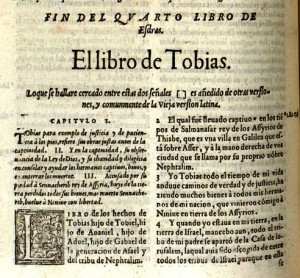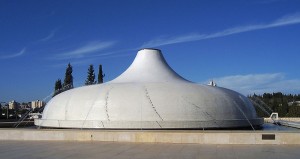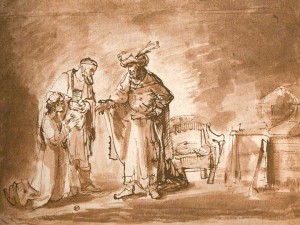The Significance of Outside the Bible
Outside the Bible will be published this fall and and can be preordered from University of Nebraska Press. In honor of the upcoming publication, a bit about the significance of the Apocrypha, Pseudepigrapha, Hellenistic Jewish literature and the Dead Sea Scrolls:
One of the most significant characteristics of Second Temple Judaism is the wide variety of texts that circulated among different groups of Jews. We are accustomed to treating these documents in classes, based more on their transmission than their literary and theological characteristics. So we speak of Apocrypha, Pseudepigrapha, and Dead Sea Scrolls, designating in the first and last instance specific groups of texts collected in some way in Antiquity. Pseudepigrapha is a catch-all term which has been used increasingly loosely in recent years. Taken together, we gain from all these texts a picture of a Jewish community, both in and outside of the Land of Israel, producing all kinds of literary works and involved in vigorous debate about all kinds of religious questions. Outside the Bible presents a wide variety of these texts classified by their content and literary character, not by the ancient… Continue reading
How to Study a Dead Sea Scrolls Text: The Context of the Scrolls
 There seems to be a general understanding of the context in which we study the Scrolls but it seems to remain unarticulated. This should be readily apparent since we have been witness to an absurd debate regarding the archaeological evidence that has in fact obscured the real questions that need to be discussed about the significance of the archaeological context. But I will leave this area as it is not my area of expertise.
There seems to be a general understanding of the context in which we study the Scrolls but it seems to remain unarticulated. This should be readily apparent since we have been witness to an absurd debate regarding the archaeological evidence that has in fact obscured the real questions that need to be discussed about the significance of the archaeological context. But I will leave this area as it is not my area of expertise.
Rather, I want to talk about what I would call the interpretive context. By this I refer to the problem that we all face with the various types of parallel materials we cite, namely Hebrew Bible, Second Temple Texts, New Testament and Rabbinic literature, to name the significant ones. I do not mean here to suggest that we are following wrong approaches, but rather that we are often not sufficiently self-aware or, alternatively, we are afraid to use these sources despite their being almost always the key to understanding our texts.
That most Qumran texts, whether sectarian or not, are highly dependent on what we call biblical texts is unquestionable. From my point of view, this dependence is one of the… Continue reading
How to Study a Dead Sea Scrolls Text: Consensus and Dissidents

Shrine of the Book, Israel Museum, http://commons.wikimedia.org/wiki/File:Israel_-_Jerusalem_-_Shrine_of_the_Book.jpg
I want to introduce a related problem that we have had in understanding our own field. This has to do with the discussion of the “consensus” vs. what are often called dissident theories. This terminology masks some very important issues in the epistemology of scholarship and I think that we do ourselves a disservice with this kind of description. To many, this term implies a political rather than an academic Weltanschaung.
Humanities scholarship is not hard science. We need to remember that even in hard science there is human evaluation of the results of observation or experimentation. Once the facts are correctly established, scientists will debate the meaning of those facts. The inability to show that the facts are real facts usually results in complete disqualification of the research. In Humanities we also deal with facts and with the evaluation of those facts. Actually, however, there are three categories: Actual, provable facts, similar to those in hard science, then what I would term “soft facts,” which means that scholars have different opinions about the nature of the data itself. Such an intermediate category is… Continue reading

